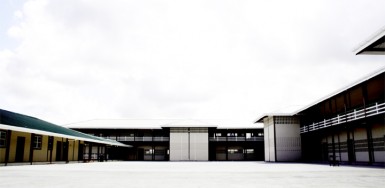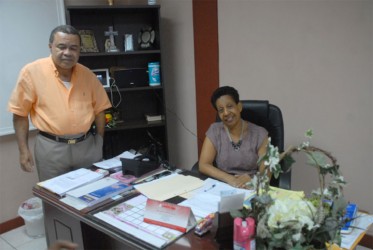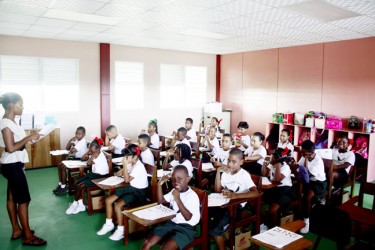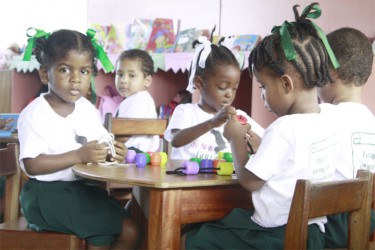Alfonso de Armas Mitchell and his wife Margarita have come a long way from twenty-one years ago when they first came to Guyana where he had been offered a job as a Marketing Executive with the Subryanville-based French firm, Amcar, that packages and exports Heart of Palm. Both lifelong educationists, their first investment in the sector came less than two years after they arrived here, a privately-run school for thirty students that occupied part of their Eping Avenue home.
Expansion over time saw the New Guyana School occupy premises in Brickdam and subsequently in

Middleton Street, Campbellville. Today, the ambition of the Colombian-born couple to create a permanent home for an educational institution that has been one of the pioneers of contemporary private school tuition has been accomplished. The New Guyana School, located at Plantation Houston, is a multi- million dollar investment that seeks to raise the bar for educational facilities in Guyana.
Both Mitchells are from the archipelago of San Andrés, Providencia y Santa Catalina, identified by UNESCO as a World Biosphere Reserve, located 480 miles (720 km) northwest of the Colombian Caribbean Coast.
When Stabroek Business spoke with Alfonso Mitchell earlier this week, the New Guyana School’s Administrative staff was already on duty preparing for the September 9 start of the new academic year. With more than 800 students currently on roll its design is dominated by lengthy corridors, spacious classrooms that resemble mini lecture theatres and a pair each of tennis and basketball courts set in the centre of the construction.
The focus, Mitchell says, is on “high standards.” The school’s Computer and Chemistry laboratories are elaborate and well-equipped. The latter, Mitchell boasts, “is the best in the country.”
There is a broader strategic business significance to the location of the New Guyana School on part of the Vieira-owned Plantation Houston. The citing of the attractive school complex appears to have been attended by other investor interests. Already, there is evidence of housing construction on the same estate, in areas close to the school.

The entire ground floor of the two-storeyed structure is dedicated to the school’s Nursery section as is the small nursery playground that is hugged by the complex. During our tour of the premises Mitchell showed off the school’s nursery gymnasium. “Children,” he said, “need physical exercise as part of their orientation.” He makes an off-handed comment about the importance of avoiding obesity in young children.
Schools in Guyana have cultivated the habit of parading the accomplishments of their students at the National Grade Six Assessment and the CXC Examinations. The practice goes way beyond simply ‘showing off.’ It is a marketing technique that sends a message about the school’s academic standards. The New Guyana School has created a huge 2013 CXC Honours Roll with photographs of the honorees and details of their accomplishments. It is, he says, a tribute to the school’s investment in excellence, in creating a convivial learning environment that includes the acquisition of “well-qualified, well-paid” teachers.

At work in her own office inside the complex, Margarita Mitchell is dismissive of concerns about her designation in the New Guyana School’s hierarchy. The one-time lecturer in Nutrition at Bogota’s Pontificia Universidad Javeriana appears content to serve as a kind of quality control overseer, mindful of ensuring the school’s delivery of high standards in everything from tuition to extra-curricula facilities. Rather than discuss her own academic credentials she prefers to bring her credentials as a Nutritionist to bear to express her concern that young children ‘eat right.’ What is put into the lunch kits of young children can have a powerful impact on how well they perform in school. Part of her current preoccupation is with strengthening the school’s relationship with parents on issues that have to do with their children’s dietary routines.
Once you get Margarita Mitchell talking you are inclined to question her initial assertion that she is a “shy” person. Her own mindfulness of children’s diet apart, Margarita Mitchell is preoccupied with what she regards as the school’s obligation to provide parents with value for their investments.
If she is not unmindful of the importance of shrewd management of their business investment, Ms. Mitchell says that their business pursuits cannot be divorced from the importance of a social conscience. She is, she says, acutely aware of the fact that private school education in Guyana is by no means the exclusive forte of the middle class. “Ordinary people are no less interested in providing their children with a good education.” Accordingly, the school’s policies include providing some measure of subsidy for children deemed to be deserving. Margarita Mitchell says that her own

discerning eye is able to detect those needy cases. “I don’t wait for the parents to approach me. I approach them with offers of help. The Mitchells estimate that the New Guyana School offers around $5million in fees subsidies and other requisites to students each year.
Alfonso says that offering value for money includes providing the best possible environment in which the students can “grow and learn.” The school, he says, has sixty sets of toilet facilities and a service that allows for hourly inspections of those facilities by the sanitation attendants.
Each Department of the New Guyana School – Nursery, Primary and Secondary – has its own principal, a facility which, Mitchell says, enables each to receive specialist attention. The school, he says, is constantly on the lookout for high-quality teachers and is prepared to compete on the market to secure those teachers.
Beside its routine curriculum, the New Guyana School has embarked on a regime of Adult Education and a range of Business Courses. Mitchell himself is in charge of that service. As of the new academic year the New Guyana School will be offering additional A Level and CAPE tuition to non-attendees of the school. Apart from providing a service to children whose substantive schools lack the facilities to provide effective tuition in key natural sciences, the school’s ‘extra lessons’ programme provides additional income for its own teachers.
Alfonso Mitchell admits to feeling a sense of being settled and is looking forward to enhancing both the physical and the intellectual environment at the New Guyana School. Among the school’s immediate-term objectives is the expansion of the school’s Information Technology Laboratory while its longer term ambitions include the eventual creation of an expanded recreational facility which it proposes to create on a new plot of land acquired from the Houston Estate.





